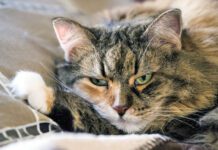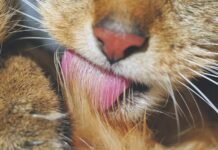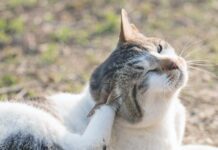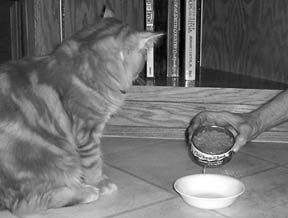
288
You open the can and your cat comes running. Then you place the bowl down on the floor and hold your breath – it looks like shes interested, but she soon starts to scratch at the bowl just like she does in the litterbox. As she quickly leaves the kitchen, you realize that your cat has rejected yet another great entre. Finicky cats are more than frustrating; they can make you worry if they are eating enough to sustain their health.
Hard to Please
Cats can enjoy the same food for a long time and then suddenly turn away from it without any apparent reason. Ruling out medical problems, only a small number of cats are truly finicky, according to Ilona Rodan, DVM, of the Cat Care Clinic in Madison, Wisconsin. But there are reasons for their fussiness and ways to overcome them.
Its critical to identify any medical problems which may be affecting your cats eating habits, says Dr. Rodan. In 90 percent of cats with an underlying medical problem, the first sign is getting picky about food. Tooth pain, a diminishing sense of smell – particularly in an older cat – respiratory infections and kidney disease are just a few of the many diseases that may curb a cats appetite.
When your veterinarian rules out medical causes, you should consider your cats feeding environment. If your cats bowl is too small, it can make contact with her sensitive whiskers. Or she may feel frustrated if the bowl slides around on the floor, or if food spills out and underneath the sides of a flat dish. Plastic bowls, which can retain odors from previous meals and dishwashing detergent, can make food unpalatable.
A cats appetite is also affected by stress. Does your cat share a bowl with another cat? The other feline may dominate and inhibit your cat from eating pleasurably. (An easy solution is to provide one food bowl per cat.) Most cats dont like to eat where there is a lot of noise, from a washing machine for instance, or where there is steady foot traffic. A friendly toddler pulling Kittys tail while shes trying to eat can also ruin his meal. If there has been a recent loss of a human or animal companion, your cat may not eat as well temporarily. And if you and your cat have moved recently, that can be another stressor.
Do you feed your cat table scraps? Thats a good reason why he may be turning up his nose at cat food. Be sure to count the treats as part of your cats overall diet. Another idea to consider: If your cat goes outside, you may have a well-meaning neighbor who is also feeding your cat.
When it comes down to it, though, some cats are just plain fussy. Anything about a food – its smell, flavor or texture or temperature – may cause a cat to change her mind about a meal.
Dinner is Ready
Preventing pickiness is easier than curing it. If you give kittens or young cats a variety of foods right from the beginning – canned and dry types of different shapes and sizes – they are much less likely to become fussy eaters, says Dr. Rodan. But if your cat is already picky, you can try several things to enthuse your cat about his food.
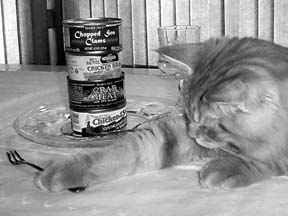
288
First, make sure your cats eating environment is comfortable and stress-free. Some cats actually prefer your company when they begin eating, so try talking gently to your cat when she goes over to her plate. Its also important to keep the eating area separate from her litter box.
To stimulate your cats appetite – especially if she has been ill – you can pour a little tuna or clam juice over his food. Because the taste and smell of food is enhanced when it is warm, try warming up canned food to make it more palatable.
You can temporarily add some strong flavors to your cats regular diet, like 9 Lives Tuna, Fancy Feast or even chicken baby food, suggests Rodan. (Just be sure the baby food doesnt contain onion powder, which can be dangerous for cats.) Eating should be a pleasure for cats, just as it is for their human companions. Try a few tricks and your fussy cat will begin to enjoy mealtime again – and so will you.
Prevent Hepatic Lipidosis
Hepatic lipidosis (fatty liver) is a serious condition that may result when a cat stops eating for a few days or more, or becomes very picky for one or more weeks (see CatWatch, December 2003). Often occurring in heavier cats, the disease results from the body breaking down fat stores when the cat doesnt eat. If the cat has excessive fat to begin with, the liver can become infiltrated with fat and begin to fail, according to Dr. Rodan.
Intensive treatment – involving feeding tubes and medication – may be required but is not always successful. Thats why if your cats eating habits change for 24 hours or more, you should contact your veterinarian promptly, says Dr. Rodan.

